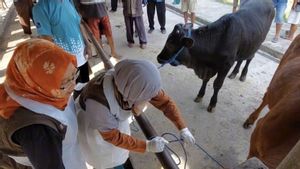JAKARTA - The stunting or malnutrition reduction program in the country is vulnerable to corruption. This striking practice can occur during the budgeting process, procurement, and supervision.
"There are several practices in efforts to deal with stunting prevalence that risk causing corruption," said Niken Ariati, National Strategic Daily Coordinator for Corruption Prevention (Stranas PK) in a written statement, Thursday, January 26.
In the budgeting aspect, continued Niken, there are indications of overlapping planning and budgeting between the central and regional governments.
Meanwhile, in the procurement aspect, there are funds that have not been used optimally. In addition, there are goods that are procured but are not needed.
"As an example for the Additional Food Supply program (PMT) which is uniformed to all regions without analyzing the needs of objects. This makes the procurement of goods useless to the community," he said.
Next, the KPK also found that the procurement of props was centralistic so that the role of vendors was limited. In fact, this procurement should have received a license from the National Population and Family Planning Agency (BKKBN).
Meanwhile, for supervision, the gap in corruption is also open because there are no technical guidelines. As a result, relevant stakeholders are not optimal in conducting surveillance or audits.
"Practices in these aspects are very risky to cause irregularities that lead to criminal acts of corruption. This cannot be underestimated because it will have an impact on nutrition health services that the community gets," said Niken.
Not only that, Niken also said that the KPK received information that there was a government inspectorate who did not carry out its duties optimally in an effort to reduce stunting.
"In addition, budgeting for this program is also not a priority for several regions even though this program is a national priority," he said.
Regarding these findings, the KPK then proposed several things. One of them is the integration of planning and budgeting between the central and regional governments to prevent overlapping.
The Ministry of Home Affairs (Kemendagri) must formulate guidelines to make it easier for local governments.
Another suggestion is that the study of the effectiveness of the goods produced and the administrative burden must be carried out taking into account the needs. Thus, procurement can be beneficial for the community in an effort to reduce stunting rates.
"Technical guidelines are needed that the Inspectorate will use to supervise the stunting prevalence reduction acceleration program. These recommendations are expected to prevent irregularities in an effort to accelerate the reduction in stunting prevalence," concluded Niken.
The English, Chinese, Japanese, Arabic, and French versions are automatically generated by the AI. So there may still be inaccuracies in translating, please always see Indonesian as our main language. (system supported by DigitalSiber.id)













